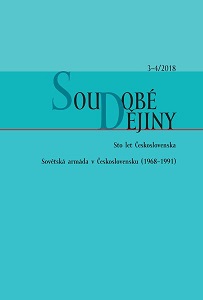Normalizace ve své epoše
Normalization in its epoch
A reaction to Miloš Havelka’s polemic
Author(s): Pavel KolářSubject(s): History, Cultural history, Recent History (1900 till today), Post-War period (1950 - 1989), History of Communism
Published by: AV ČR - Akademie věd České republiky - Ústav pro soudobé dějiny
Keywords: Czechoslovakia 1968-1989;normalisation in the Czechoslovak Socialist Republic;Prague Spring;czech society;communist regime in Czechoslovakia;Alltagsgeschichte;totalitarianism;
Summary/Abstract: The polemic concerns Havelka’s review of the book by Pavel Kolář and Michal Pullman Co byla normalizace? Studie o pozdním socialismu (What was the normalization?: A study on the late socialism). Prague: Nakladatelství Lidové noviny and Ústav pro studium totalitních režimů, 2016), which was published under the title “Ideological criticism of the ideological criticism of the normalization” in the previous issue of Soudobé dějiny (Vol. 25, No. 1–2, 2018, pp. 229–243). The author argues with the reviewer’s reproof suggesting that the approach of the authors of the book referred to above was based on a selectively chosen list of published sources, claiming that their approach is anchored in principal trends of international research on the social and cultural history of socialist dictatorships. While some texts in their book maybe of a rather programmatic nature and/or may not be always fully supported by arguments, as claimed by Havelka, Kolář explains that their intention was to provide stimuli for further research rather than to write a historical synthesis (required by Havelka). At the same time, Kolář states that their overall conceptual approach substantially differs from that of Havelka, based on the theory of totalitarianism which has already been, in Kolář’s opinion, surpassed by many empirical studies. It must be noted that the concept of Kolář and Pullmann is anything else but an apology, downplaying, or even disguised sympathies with the socialist dictatorship,as the review seems to suggest. If their approach is “ideological and engaged”, then only in that they are after a self-reflection of the society which was co-responsible for the previous situation and cannot lie to itself that the “Bolsheviks” should be blamed for everything. In their work, they also attempt to historicize the normalization regime which cannot be measured and assessed by the final collapse, but only on the basis of the period context, intentions, and illusions. In this respect, they do not view the ideology at the time of the normalization as simply emptied, but instead attempt to capture its functional semantics. Furthermore, the author polemicizes with Havelka about the concept of legitimacy in Max Weber’s works and on the position of violence in this concept and its usability in analyses of stabilization mechanisms of the normalization regime. Kolář devotes the final part of his response to a defence of his article on the Prague Spring of 1968 against Havelka’s criticism.
Journal: Soudobé Dějiny
- Issue Year: XXV/2018
- Issue No: 3+4
- Page Range: 523-536
- Page Count: 14
- Language: Czech

